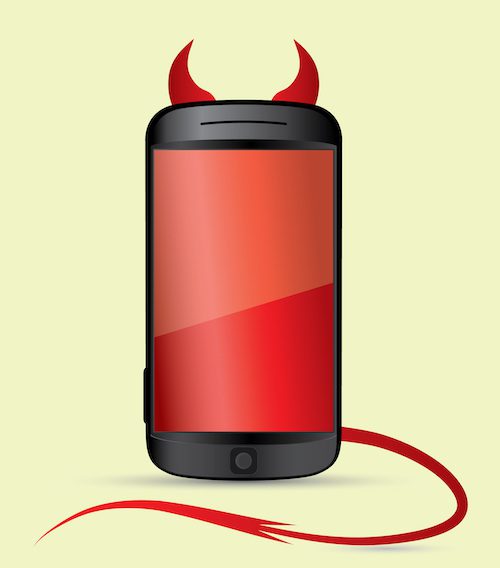Catholicism, Islam, Devil Smartphones

In late tonight from a great event in Tyler, Texas, with so many wonderful people AND a taco from Torchy’s. Here are a few items that caught my eye as I’m going to bed.
1. The federal probe of Catholic dioceses for sex abuse is going to be far broader than anyone imagined. From the NYT:
The Department of Justice has sent a sweeping request to every Roman Catholic diocese in the United States not to destroy documents related to the handling of child sexual abuse, a sign that the federal investigation into the church could grow far more extensive.
Catholic bishops have been asked by the federal government to retain their files on a broad array of internal matters, including sexual abuse investigations, and the transfer of priests across state or international borders, or to treatment centers. The request includes documents contained in “secret archives” — the confidential files that are kept by each diocese.
News reports last week revealed that the Justice Department had opened an investigation into all eight Catholic dioceses in Pennsylvania, and the diocese of Buffalo in New York. This marked the first time the federal government had undertaken an investigation of the church’s handling of abusive priests, a scandal that surfaced in the United States in the mid-1980s.
But this request to preserve files, first disclosed by Whispers in the Loggia, a site that closely follows the Catholic hierarchy, suggests that federal investigators are throwing a very wide net. The abuse scandal, long fueled by the shocking details in the church’s own personnel documents, may now grow like an uncontrolled wildfire.
Uncontrolled wildfire. I never imagined that we would live to see the day. What could that possibly mean, though? Thoughts?
2. It is now against the law in Europe to speak ill of Islam, according to a shock ruling by the European Court of Human Rights. From the WSJ:
Europe’s highest human rights court ruled on Friday that disparagement of religious doctrines such as insulting the Prophet Muhammad isn’t protected by freedom of expression and can be prosecuted.
The European Court of Human Rights upheld a 2011 verdict by an Austrian court that sentenced an unnamed woman to pay a fine for alleging that the figurehead of Islam had pedophilia tendencies.
The woman was originally convicted under Austria’s law against disparaging religious doctrines for referring to the marriage between the Prophet and a six-ear-old Aisha as “pedophilia” at a 2009 seminar, sponsored by the right-wing populist Freedom Party, entitled “Basic Information About Islam.”
She appealed the verdict to the Strasbourg-based ECHR, a supranational court that hears human rights appeals from citizens of 47 European countries, arguing that she aimed to contribute to a public debate.
The ECHR said it rejected her appeal after finding that the Austrian courts “carefully balanced her right to freedom of expression with the right of others to have their religious feelings protected, and served the legitimate aim of preserving religious peace in Austria.”
What that woman said was rude and offensive, but where does Europe draw the line? People have the right not to have their religious feelings hurt? Really?! So, at what point does robust criticism of Islam (or any other religion) cross the line into illegality? Does a Muslim who is offended by someone saying publicly that Islam is a false religion — does that Muslim get to file charges against the infidel?
Thank you, Lord, for the First Amendment to the US Constitution.
3. “I am convinced the devil lives in our phones and is wreaking havoc on our children” said a woman who works for Mark Zuckerberg’s philanthropy. It’s from a NYT story about an emerging consensus in Silicon Valley that kids should not have screens. More:
For longtime tech leaders, watching how the tools they built affect their children has felt like a reckoning on their life and work.
Among those is Chris Anderson, the former editor of Wired and now the chief executive of a robotics and drone company. He is also the founder of GeekDad.com.
“On the scale between candy and crack cocaine, it’s closer to crack cocaine,” Mr. Anderson said of screens.
Technologists building these products and writers observing the tech revolution were naïve, he said.
“We thought we could control it,” Mr. Anderson said. “And this is beyond our power to control. This is going straight to the pleasure centers of the developing brain. This is beyond our capacity as regular parents to understand.”
He has five children and 12 tech rules. They include: no phones until the summer before high school, no screens in bedrooms, network-level content blocking, no social media until age 13, no iPads at all and screen time schedules enforced by Google Wifi that he controls from his phone. Bad behavior? The child goes offline for 24 hours.
“I didn’t know what we were doing to their brains until I started to observe the symptoms and the consequences,” Mr. Anderson said.
Discuss. I’m giving a talk at a high school in the morning, then on the road back home to Louisiana.

Subscribe for as little as $5/mo to start commenting on Rod’s blog.